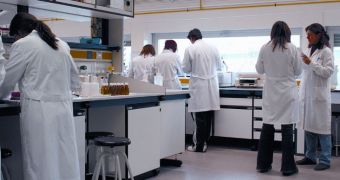I was thinking the other day about the mockery now going on in the United States, as some interest groups are attempting to place a ban on federal funding for stem cells. Then I thought about a trend I noticed in people, and in how they perceive science and technology today.
Sadly enough, it would appear that we are currently facing a very real risk of stagnation, as far as science go. Whereas the field has been progressing steadily until now, we appear to be intent in stopping it, or disregarding its beneficial effects.
It would appear that lately nobody seems capable of taking any risks in research, and that experts want to play it safe, and politically-correct.
In my opinion, there is nothing worst for science and technology research then trying to please everyone with work. Naturally, I'm talking here about the stem cell issue.
The two researchers that obtained the ban cited moral issues in their request to a judge to ban all federal funding to embryonic stem cell research.
I can see how this field can raise debate and interpretations between religious groups and the scientific community. In fact, regardless of what many say, the two are indeed in opposition to each other.
Pastors and religious scientists have tried proposing that religion and science are complementary, but they are obviously not, considering how they come in conflict even in the most basic regards.
Embryonic stem cell research is one of them. While religious people say that small human infants are killed, science regards an embryo as a collection of cells, not yet capable of experiencing pain or emotions.
On the other hand, objectively speaking, no one can deny the possible health benefits of using embryonic cells for synthetic biology and regenerative medicine. And religious folk have no right to deny all others the chance at recovery.
By disputing the validity of ESC research, they are basic condemning thousands to die. These patients would otherwise be saved if innovations in their therapies are achieved via stem cell research.
But I digress. The point was that scientists are now bound by ethical debates that are really out of place. This one, about the human embryos, should have been settled years ago.
But, due to the liabilities and other issues threatening the scientific community, very few researchers are willing to step outside of the proverbial box, and conduct groundbreaking research.
What I was thinking about these past few days is that this is a very dangerous slope we're on. What road will science take in the future, if researchers can only conduct work in clean, morally-sound areas?
Two possibilities really stand out. Either the focus of science in general becomes limited, or even more heated and widespread debates occur, but we continue to progress.
What really amazes me, I guess, is the fact that people seem willing to destroy, regulate, put boundaries on, or otherwise impair the only thing that has ensured constant progress.
If we managed, for example, to create vaccines and antibiotics – which helped save tens of millions of lives, why can't we build artificial livers and hearts to prolong our lives? What are the ethical reasons for this, other than some religious delusions? Bah!
But, while I imagine many researchers agree with me, they cannot get past the fact that it's way too easy for so-called “concerned citizens” (read self-righteous) to impair valid scientific work.
The really sad part of all this is that the person suing a government agency and so on acts on his or her own religious, or moral belief, regardless of whether the actions themselves can condemn others.
If the technology to save lives can be made available, but it's not introduced because some groups oppose it on unscientific basis, then aren't those groups responsible for all the lives that could have been saved with the technology?
I tend to think that they are. They are accomplices in either case. And the behavior other people and authorities have in regards to these groups should be tuned as such.
Another thing I noticed is that people tend to become self-complacent and cowardly once they reach a certain livelihood threshold.
They progress in wealth and possessions up to a point where they consider any further progress as a threat to the life they already made for themselves.
There is no other way to explain why individuals would ban entire areas of science, that have such great potential for the future. They are simply scared of what might happen.
And frightened people are the most dangerous variety, especially when they are in positions of power. This happens now in the United States, and the results are devastating for science here.
In other words, I think, many people are trying to destroy or impair the very mechanisms that allowed them to advance so much. Stagnation is the most likely outcome of all this.
What would have happened throughout history if all or some of the greatest researchers to have ever lived gave up on trying to change their contemporaries' minds about stuff worked?
Galileo almost paid with his life for agreeing with Copernicus on how the solar system is set up, and on the fact that Earth revolves around the Sun. Many things we not take for granted are the fruit of some scientist's life-long efforts and struggle.
Maybe you have a good idea of why science is battered beyond control in these sensitive areas. They are not objectively sensitive, but are made so by interested groups.
So would it be a good idea to fight them? What are your opinions on this issue?

 14 DAY TRIAL //
14 DAY TRIAL //